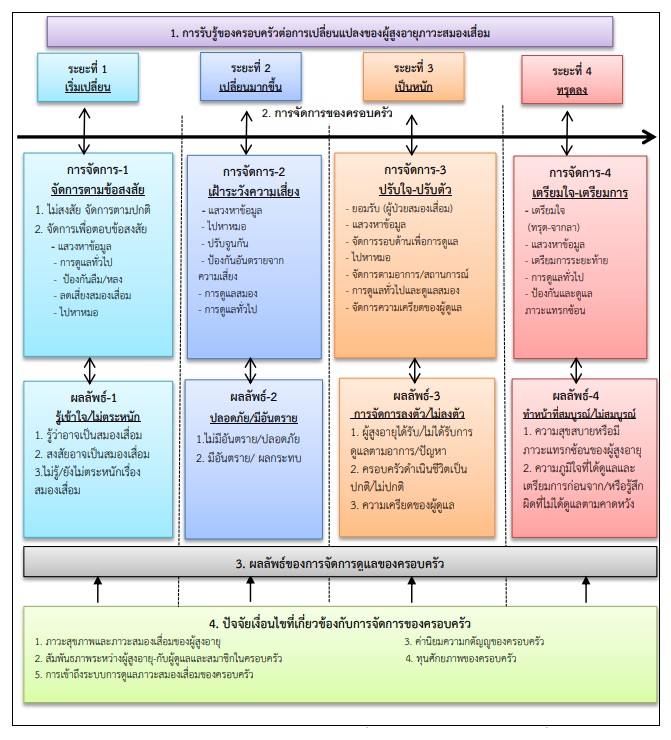การจัดการของครอบครัวในการดูแลผู้สูงอายุภาวะสมองเสื่อม
คำสำคัญ:
ผู้สูงอายุ, ภาวะสมองเสื่อม, การรับรู้อาการ, การจัดการของครอบครัว, การวิจัยสร้างทฤษฎีจากข้อมูลบทคัดย่อ
การวิจัยสร้างทฤษฎีจากข้อมูลนี้ มีวัตถุประสงค์เพื่อศึกษาปรากฏการณ์การจัดการของครอบครัวในการดูแลผู้สูงอายุภาวะสมองเสื่อม ผู้ให้ข้อมูล คือ ผู้ดูแลในครอบครัวรวม 60 คน จาก 49 ครอบครัว เก็บข้อมูลโดยการสัมภาษณ์เชิงลึกและการสังเกต ใช้การวิเคราะห์เชิงเปรียบเทียบข้อมูล ผลการศึกษา พบทฤษฎีการจัดการของครอบครัวในการดูแลผู้สูงอายุภาวะสมองเสื่อม เป็นกระบวนการการจัดการของครอบครัวที่เปลี่ยนแปลงไปตามการรับรู้ถึงการเปลี่ยนแปลงของผู้สูงอายุภาวะสมองเสื่อมใน 4 ระยะ คือ 1) ระยะเริ่มเปลี่ยน-จัดการตามข้อสงสัย 2) ระยะเปลี่ยนมากขึ้น-จัดการเฝ้าระวังความเสี่ยง 3) ระยะเป็นหนัก-จัดการปรับใจและปรับตัว และ 4) ระยะทรุดลง-จัดการเตรียมใจและเตรียมการครอบครัว (เผชิญการสูญเสีย) ข้อค้นพบนี้เสนอแนะว่า กระบวนการการจัดการของครอบครัวเพื่อการดูแลผู้สูงอายุภาวะสมองเสื่อมนั้นต้องคำนึงถึงการรับรู้ในการเปลี่ยนแปลงอาการของผู้สูงอายุ โดยมีปัจจัยเงื่อนไขของการจัดการในแต่ละระยะ ซึ่งส่งผลต่อผลลัพธ์เชิงบวกหรือเชิงลบในการจัดการในแต่ละระยะตลอดกระบวนการนี้
เอกสารอ้างอิง
Beeber, A. S. & Zimmerman, S. (2012). Adapting the FMSF for Families Caring for Older Adults with Dementia. Journal of Family Nursing, 18(1), 1-17. Retrieved February 4, 2015, from https://www.ncbi.nlm.nih.gov/pmc/articles/PMC3872061
Cohen, L. W., Zimmerman, S., Reed, D., Sloane, P. D., Beeber, A. S., Washington, T et al. (2014). Dementia in Relation to Family Caregiver Involvement and Burden in Long-Term Care. Journal of Applied Gerontology, 33(5), 522–540. Retrieved December 10, 2015, from https://www.ncbi.nlm.nih.gov/pmc/articles/PMC3989456/
Foundation of Thai Gerontology Research and Development Institute, & Institute for Population and Social Research, Mahidol University. (2020). Situation of the Thai elderly 2019. Nakhon Pathom: Printery. (in Thai)
Jang, H. Y., & Yi, M. (2013). Effects of Burden and Family Resilience on the Family Adaptation of Family Caregivers of Elderly with Dementia. Korean J Adult Nurs, 25(6), 725-735. Retrieved December 20, 2015 from https://synapse.koreamed.org/articles/1076234
Knaft, K., Deatrick, J., & Havill, N. (2012). Continued Development of the Family Management Style Framework. Journal of Family Nursing, 18(1), 11-34.
Muangpaisan, W. (2013). Burden of Dementia. In Muangpaisan W. (Ed.), Dementia: Prevention, Assessment and Care. (p. 9-15). Bangkok: Parbpim. (in Thai)
Office of the National Economic and Social Development Council. (2019). Report of the Population Projections for Thailand 2010-2040 (revision). Bangkok: Amarin. (in Thai)
Saowaphan, J., & Lertrat, P. (2016). Caregiving Experience of Caregivers of Older Persons with Dementia. Journal of Nursing and Health Care, 34(3), 110-116. (in Thai)
Sasat, S., Choowattanapakorn, T., Pukdeeprom, T., Lertrat, P., & Aroonsang, P. (2013). Long-Term Care Institutions in Thailand. Journal of Health Research, 27(6), 413-418. Retrieved July 27, 2015, from https://he01.tci-thaijo.org/index.php/jhealthres/article/view/88736
Sihapark, S., Chuengsatiansup, K., & Tengrang, K. (2014). The Experience of Burden and Impact Involving in Long-Term Care for the Elderly in Thailand (Research Report). Nonthaburi: Health Systems Research Institute. (in Thai)
Sikolia, D., Biros, D., Mason, M., & Weiser, M. (2013). Trustworthiness of Grounded Theory Methodology Research in Information System. MWAIS 2013 Proceedings. 16. Retrieved November 20, 2015 from: http://aisel.aisnet.org/mwais2013/16.
Sritanyarat, W., Aroonsang, P., Leethongin, M., Piyawattanapong, S., & Panpanich, L. (2015). Lesson Learned and Synthesis Continuous Elderly Care Services System: Stroke and Dementia. Khon Kaen: Klungnanavittaya. (in Thai)
Strauss, A., & Corbin, J. (1998). Basics of Qualitative Research: Techniques and Procedures for Developing Grounded Theory (2 nd.). California: Sage.
Watthanachai, P. & Tirapaiwong, Y. (2019). Family Management: Concept and Implementation Guidelines to Help Families of Children with Chronic Illness. Nursing Journal of the Ministry of Public Health, 29(2), 12-23. (in Thai)
Zhang, H., Xiong, R. H., Hujiken, S., Hujiken, S., Zhang, J. J., & Zhang XQ. (2013). Psychological Distress, Family Functioning, and Social Support in Family Caregivers for Patients with Dementia in the Mainland of China. Chinese Medical Journal, 126(18), 3417-21. Retrieved May 12, 2015, from https://medcentral.net/doi/pdf/10.3760/cma.j.issn. 0366-6999.20131254

ดาวน์โหลด
เผยแพร่แล้ว
ฉบับ
ประเภทบทความ
สัญญาอนุญาต
ลิขสิทธิ์ (c) 2022 วารสารการพยาบาลและการศึกษา

อนุญาตภายใต้เงื่อนไข Creative Commons Attribution-NonCommercial-NoDerivatives 4.0 International License.





